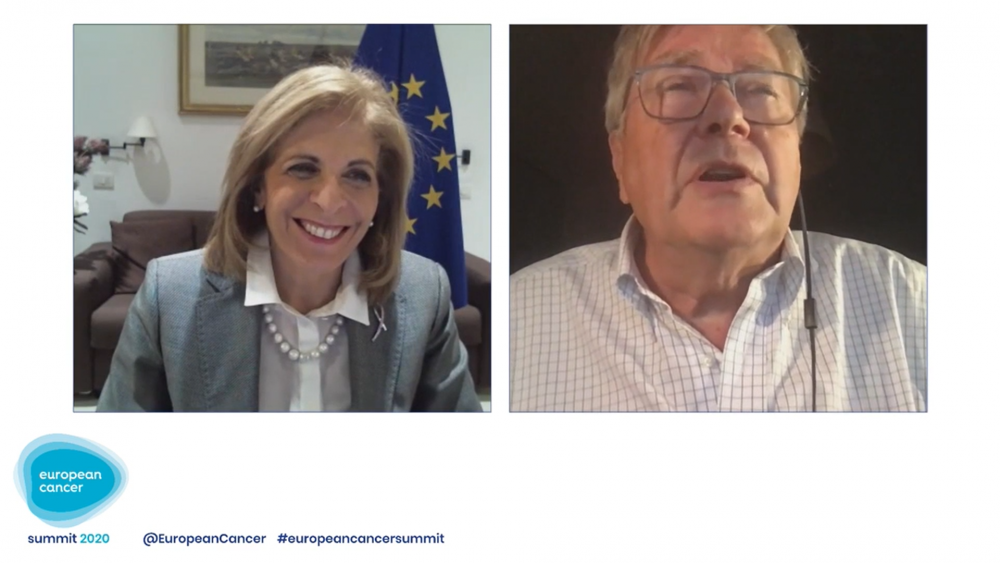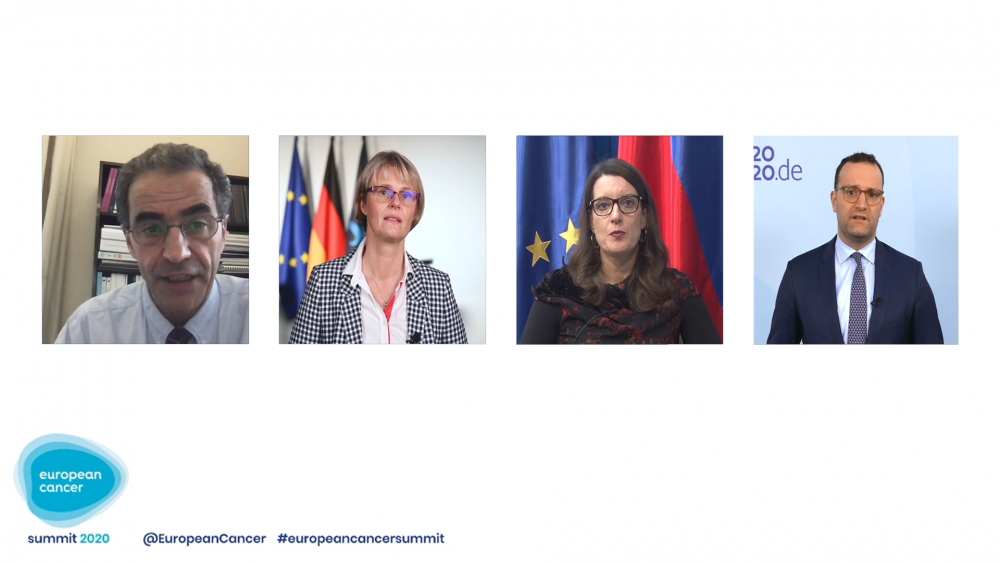Europe’s Beating Cancer Plan
Matti Aapro, President of the European Cancer Organisation, opened the session by underlining that Europe’s Beating Cancer Plan[11] must be ambitious but must not reinvent the wheel. This means using pre-existing projects and improving on them to increase coordination between countries in combatting cancer. He also announced a Resolution, to be voted on at the end.
More Europe in Public Health
Stella Kyriakides, EU Commissioner for Health and Food Safety, who is responsible for the Plan, thanked the European Cancer Organisation for its longstanding commitment to the field and the support it has shown since the beginning of her mandate. The Organisation has given a voice to patients and helped guide EU policy in a way that is inclusive, cohesive and transparent.

From left: Stella Kyriakides (EU Commissioner for Health and Food Safety) and Matti Aapro (European Cancer Organisation; EU Cancer Mission Assembly).
She highlighted the European Code of Cancer Practice as the perfect example of the Organisation’s efforts,[5] as it illustrates the power and potential of effective partnerships and will empower cancer patients.
Nevertheless, 2020 has been a difficult year and continues to be. The severe disruption of services along the entire cancer pathway will have far-reaching consequences. Since the beginning of the COVID-19 pandemic, the number of cancer diagnoses has decreased, which points to more late diagnoses and lives lost.
It is clear that more ‘Europe’ is needed in the area of public health. The EU’s role will be strengthened, despite health continuing to be a member state competence. There is an opportunity for the EU to be more active in working with its Member States and key stakeholders, and achieve change across Europe.
Cancer needs to be addressed in a holistic way, all along the patient journey. There will be more action to prevent cancer. Early diagnosis and treatment should not be hampered by unequal access to the needed experts. Survivor numbers have increased but that has created a new set of challenges to ensure those who live with cancer not only live long but also well.
Europe’s Beating Cancer Plan is founded on partnerships and this will be key to its success. COVID-19 has reminded everyone of the vital importance of solidarity and unity of purpose. Public health authorities cannot address the challenges of cancer alone. It is important to break down barriers and save lives. We can change the realities of cancer in Europe if we work together.
This was echoed in the comments, where the importance of working together was underlined, while recognising that the challenge will be to translate policy into practice.

From left: Manuel Heitor (Minister for Science, Technology and Higher Education, Portugal); Anja Karliczek (Federal Minister of Education and Research, Germany); Simona Kustec (Minister of Education, Science and Sport, Slovenia); Jens Spahn (Federal Minister of Health, Germany).
Championing European Solidarity
Jens Spahn, Federal Health Minister in Germany, said cancer screening and treatment are a top priority and are contributing to improved survival rates.
Germany welcomes Europe’s Beating Cancer Plan, and his country has made cancer a specific focus for its Presidency of the Council of the European Union. Moreover, the Plan offers a chance to champion European solidarity and eliminate inequalities.
Its success will require a pragmatic approach, using available resources in an intelligent manner, and efficient mechanisms and structures for its implementation. Detailed discussions will be needed on a workable monitoring tool. While it is important the Plan covers all aspects of cancer care, EU Member States must be able to prioritise specific areas for implementation. But above all, the Plan can count on German support.
Mobilising Resources to Halve Cancer Deaths
Manuel Heitor, Minister for Science, Technology and Higher Education in Portugal, said 75% cancer survival at ten years is possible across Europe with a comprehensive, translational approach. By focusing along the whole cancer care continuum, cancer deaths could be reduced by 50%. However, this is a huge challenge.
Resources and infrastructure, alongside Horizon Europe and other programmes, will need to be mobilised, and research structures will need to be diversified and specialised. This includes improving access to cancer research in Central, Eastern and Southern Europe, as well as transnational research. Collaboration across different disciplines will also need to be developed, as well as between the public and private sector.
More outcomes-based research is needed, and a deeper understanding of cancer processes and tumour heterogeneity. This is critical for early detection and diagnosis. Moreover, it is crucial that what is preventable is prevented.
Beyond cancer diagnosis and treatment, health-related quality of life for survivors is a key issue and there are disparities across EU Member States. It will be crucial to improve social inclusion and cohesion across the region, and to extend networks.
Cancer research will be a key theme of the upcoming Portuguese Presidency of the European Union. Portugal will organise a European Cancer Research Summit in June 2021, with the ultimate aim of mobilising national and European organisations, research organisations, clinicians, academia and patient organisations towards the common goal of decreasing cancer deaths.
Asked about the compulsory publication of research and data sharing, Heitor said this has been a topic of discussion. There are several areas of consideration, central to which is that everyone participates. This means not just publishers or institutions but a range of institutions, including hospitals, care units and patient organisations. It is critical to have relevant data that is peer-reviewed. This will require a collective effort from physicians, researchers and institutions, and is a complex social issue.
Patient Involvement in Research
Anja Karliczek, Federal Minister of Education and Research in Germany, said a Europe united against cancer was their hope and demand at their cancer research conference in October, and she was pleased to see so many at the European Cancer Summit 2020 striving for the same goal.
Germany launched a national decade against cancer last year, and her Ministry is working with numerous partners to make significant advances and ensure patients are closely involved in improving the chances of recovery and further enhance patient prospects.
New possibilities need to be explored to improve early detection, diagnosis, treatment and after-care. Research must move quickly from the bench to the bedside. However, all of Europe is needed, as no country can succeed on its own in the fight against cancer.
Through initiatives such as Europe’s Beating Cancer Plan, and by bringing fresh impetus from the success of projects in Germany, more can be achieved together. There also needs to be more patient involvement in research, and greater alignment with the needs and priorities of patients and their families.
United Against Cancer
Simona Kustec, Minister of Education, Science and Sport in Slovenia, emphasised that strengthening and directing the research agenda to what is needed most is key to improving cancer care and outcomes, and patients lives.
To those ends, the Trio Presidency of the Council of the European Union signed the declaration on effective cancer research ‘Europe: Unite against Cancer’ in October 2020.[24] This comes at the most crucial of times, and coincides with the Plan. Together with Horizon Europe and other initiatives, it will help turn the odds in the battle against cancer.
However, support and collaboration at national and EU levels, including cancer governance, patients, citizens, experts researchers and policymakers, is key. A governance and monitoring framework is also needed, with a focus on inclusiveness, political ownership and commitment, coherence and agility.
Stefan Gijssels, Co-Chair of the European Cancer Organisation’s Patient Advisory Committee, commented that progress continues on the technological aspects of care is also important to hep understand the large differences in cancer outcomes between and within countries, and then extrapolate those out across the region.

